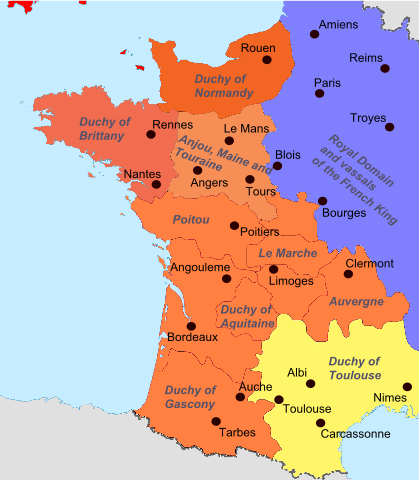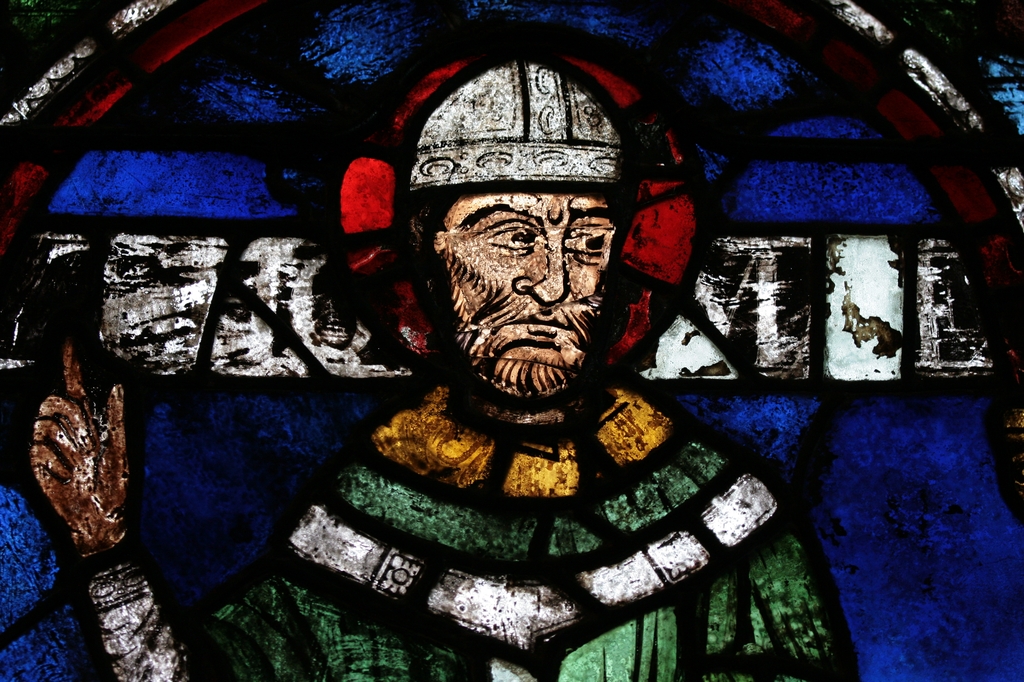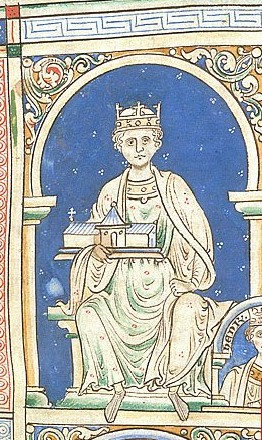Thomas Becket – Man or
Saint? Henry II – King or Sinner?
Thomas
Becket was born in circa 1118 of a middle-class Norman family. Becket was the
son of a merchant who served a term as sheriff of London. Thomas was educated
at Merton Priory, and later attended school in London and studied for a while
in Paris. After schooling Thomas worked as a clerk and accountant for the
sheriff’s office. At some point in his youth Becket made a vow of chastity. He
joined the household of Archbishop Theobald. Formerly Abbot of Bec, Theobald
had been appointed Archbishop of Canterbury by King Stephen in December 1138.
Stephen had
been in conflict with his cousin Matilda (also known as Maude) since the death
of Matilda’s father Henry 1 in December 1135. Both had claimed the crown and
the country was divided in a civil war that lasted until 1153. The period was
described at the time as a period ‘when Christ and his saints slept’
Matilda’s
son Henry had taken up the reins of the fight from Matilda in 1149 at the age
of 16. His father Geoffrey of Anjou was by that time already de facto Duke of
Normandy, but had offered to hand the dukedom over to his son as soon as he was
old enough to take over the responsibility inherent in ruling. At some point
between November 1149 and March 1150 Geoffrey made good on his word and Henry Plantagenet
was made Duke of Normandy. The King of France, who had only just returned from
a crusade, was not prepared to confirm Henry in his dukedom, especially as
there was the prospect of his being made King of England.
Geoffrey
advised his son to part with the lands known as the Vexin to assure royal
recognition of his dukedom. Peace was made in Paris in August 1151. Henry paid
homage to King Louis and was invested as Duke of Normandy. On 7th
September Geoffrey, Count of Anjou died suddenly and Henry had to journey to
Anjou to be invested as its count.
Henry’s Marriage
 |
| Eleanor's marriage to Louis |
On 18th
May 1152 Henry, Duke of Normandy, married Eleanor of Aquitaine, daughter and
heiress of the Duke of Aquitaine and former Queen of France. They were married
eight weeks after a council of French clergy had agreed with King Louis’ wishes
to be parted from his wife. Louis had loved his wife, although they were two
very different characters – she was outgoing and enjoyed flirtations while
Louis as ascetic. The marriage had produced two daughters and Louis needed a
son to inherit his throne. It is believed that this was the reason for the
divorce.
Henry was
eleven years Eleanor’s junior but was the most eligible of those wanting to marry
this exceptionally rich heiress, whose vast estates (nearly half of France)
were not directly controlled by the French crown. Eleanor avoided being waylaid
by the Count of Blois and an ambush by Henry’s younger brother Geoffrey on her
journey to Poitou where she married Henry
His Grandfather’s Heir
It was not
until November 1153 that Stephen finally met with the son of his adversary at
Winchester, in an attempt to resolve the question of inheritance of the throne
of England. Stephen's elder son Eustace had already died suddenly earlier int he year. Now Stephen agreed to make Henry his heir, dispossessing his son
William. Henry agreed to allow Stephen to reign for the remainder of his life,
providing that the king, bishops and other magnates would swear to allow Henry
to become king without denial after Stephen’s death. Henry also agreed to allow
William all the honours his father had bestowed upon him.
Stephen died
on 25th October 1154 and on 7th December Henry and his
wife Eleanor of Aquitaine set sail from Barfleur. Theobald crowned the couple
king and queen of England at Westminster Abbey on 19th December.
Henry was twenty-one, the first of the Angevin monarchs of England.
England’s Chancellor
 |
| Full extent of Angevin Empire |
Theobald
entrusted Thomas Becket with several missions to Rome and sent him to Bologna
and Auxerre to study canon law. In 1154 Becket was made Archdeacon of
Canterbury and given several benefices. In 1155 Theobald recommended Becket to Henry
as Lord Chancellor. Henry had already appointed one of Stephen’s men as head of
the administration – Richard de Lucy and created one of his own supporters, Robert
de Beaumont, his co-justiciar. Robert had been energetic in attempting to bring
both sides of the civil war together, but his support was given to Duke Henry.
Henry accepted Theobald’s recommendation, giving him Theobald’s support and
that of the English church.
As
Chancellor Thomas was much in the company of Henry and the two men became
friends, as much as any man could with the peripatetic king, whose realms
stretched from the far north of England to the Pyrenees. He was the companion
of a young and relatively inexperienced king. But even as a young man Henry was
able to extract deference from those around him. Barons and bishops bowed down
before Henry’s wrath and or intransigence.
Becket’s
chancellorship was partly notable for the state that he kept, displaying an
eagerness for marks of status and the privileges of rank. Henry’s tastes were
far simpler and his household was far less impressive. On a visit to France in
1157 Becket travelled with a great entourage, while the king’s visit was on a
far smaller scale. Becket had the king’s confidence and was entrusted with
matters above and beyond those normally given to a chancellor.
Archbishop of Canterbury
Theobald
died on 18th April 1161 and Henry pressed the suit of his friend
Thomas as candidate to the Archbishopric. An unsuccessful campaign in Toulouse
had led to a waning of Thomas’ influence on Henry. Henry was apparently warned
against the appointment, including by Thomas himself who said that the
appointment could lead to a breach in their friendship.
But Henry
was loyal to his friends and hoped to have some influence on church affairs
through his friendship with Thomas. However Thomas as Archbishop seemed to go
out of his way to insult the king, never a sensible option with a man of Henry’s
temper. Rather than follow his predecessor’s more subtle approach Thomas may
have been trying to impress his new subordinates, to prove that he was his own
man, rather than the king’s.
When he
received the Pope’s approval to his appointment Thomas resigned as Chancellor,
much to Henry’s surprise. The joining of two posts was not unusual and the
emperor of Germany had an archbishop as chancellor. Thomas claimed that he
could not manage the two roles. Thomas was also provocative in other matters,
demanding homage from one of Henry’s barons for a castle within the
jurisdiction of Canterbury. If the case had been taken to the royal court he
may have been successful, but his strategy merely inflamed the Angevin temper.
Criminous Clerks
Henry was
set on reforming the English legal system and it is for this work that his
reputation should be based on, rather than for the unfortunate events that
followed his quarrel with Thomas. The introduction of the system of trial by jury
was Henry’s triumph. The anomalous position of members of the clergy who
committed crimes was an issue that Henry wanted resolved.
As many as
one on six of the population were clerks in minor orders, most of whom would
never be ordained as priests. But they all claimed the privilege of clergy; to
be tried by the religious rather than secular authorities for any crimes. As a
result ‘clerks’ were getting away with rape, murder and worse courtesy of the
church. Henry wanted to ensure that criminous clerks were brought to justice. Becket
wanted the church to retain secular immunity for crimes committed.
Early in his
reign Henry had allowed Theobald to try and punish an Archdeacon accused of
poisoning his Archbishop. This was an action Henry no doubt now regretted. It was
however a precedent for Thomas to use. Notorious abuses of the clerical courts
were brought to the king’s attention and there can be little doubt that the secular
officials, irritated by the over 100 murders by clerks reported to the king
along with numerous cases of theft and robbery with violence, were supportive
of a change to the law.
Thomas did
realise that some cases were too flagrant breaches of law and did try to impose
harsher sentences, but in doing so he encroached upon the royal prerogative.
Bibliography
Henry II –
WL Warren, Yale University Press 2000
Eleanor of
Aquitaine – Alison Weir, Jonathan Cape 1999
http://en.wikipedia.org


An unnecessarily irritating man, Thomas....
ReplyDelete